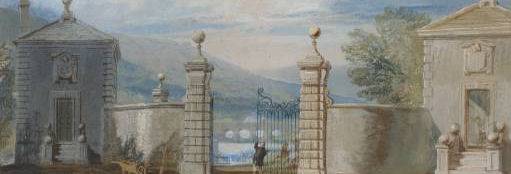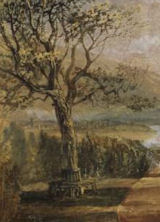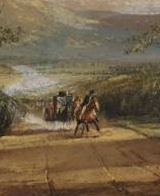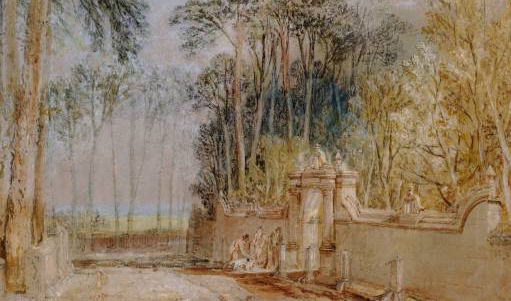




The study of an Austen Novel necessarily begins with discussion of Theme, Characters, and Plot, a routine followed in the previous Pride and Prejudice Part 1, and hopefully adequate to meet the needs of the remaining less annoying Austen Novels, whose course enables us to believe that there is a thinking human brain at the command of any work of art, but in particular a literary creation.
In addition, when considering Character, particular attention must be given to the viewpoint of the resident third-person narrator/heroine, a process of Demonic Possession in the Novels of Jane Austen that always seemed to be more or less consensual.
And then there is Sense and Sensibility, whose 'Aura' is that of an armed hijacking undertaken not even during flight but before actual takeoff, when the Novel was being transformed [from letter form Elinor and Marianne offering the prospect of at least two equal points of view] to its present structure, which more resembles an undignified struggle between would-be omniscient narrator, and exasperated author insistent upon control during those parts of the Novel where heroine/narrator is absent from the scene.
It must be assumed, therefore, that a certain confrontational atmosphere would attend the composition of the opening chapters and tidy launch of Theme, introduction of Characters, and unfolding of Plot whereby Theme and Characters are called upon to reveal their essence by action and reaction; by thought, and word, and deed, meticulously examined and described ;
If so, the heroine/narrator seems to have won such an initial encounter hands down by doing away completely with introductory pages and presenting instead Sense and Sensibility's existing Chapter One, which purports to set out as hard emotionless immutable fact all the pertinent details sufficient to explain the shift between preparation and action which in other Novels enables a reader to grasp the subsequent story:—
Here endeth the first chapter.
[ Of course the above opening paragraphs have been savagely edited in the interests of brevity, but for visitors who might not have the Novel Sense and Sensibility at hand, this is a link to the Gutenberg Online version of the Novel. ]
* * * * *
' ... The old gentleman invited and received into his house the family of his nephew Mr. Henry Dashwood, the legal inheritor of the Norland estate, and the person to whom he intended to bequeath it ...'
Sense and Sensibility, opening paragraph
Why does this paragraph remind us of Pride and Prejudice's Mr. Wickham?
And Elinor Dashwood hasn't even needed to wait until Chapter Sixteen and a Sense and Sensibility equivalent of Aunt Phillip's Whist Party in order to stake Envy's distinctive and unmistakeable claim:—
Which means that such Plot as does exist will devote itself to endeavouring to prove Elinor's superior, and possibly legal right to whatever she happens to covet.
________________________
' By a former marriage, Mr. Henry Dashwood had one son ...'
Sense and Sensibility, Chapter 1 paragraph 2
Elinor Dashwood is remarkably cavalier in dismissing any rights either her elder brother might have as firstborn, or his little son as male, to continue the tradition of the family of Dashwood [having] long been settled in Sussex. It appears to me that the ending phrase 'their father [had] only seven thousand pounds in his own disposal; for the remaining moiety of his first wife's fortune was also secured to her child, and he had only a life-interest in it' means that the family has been living in comfort on such 'life-interest' as will now pass to John, her son.
That neither John nor his son don't need Norland Park as much as the female Dashwoods is less relevant than Elinor seems to understand. — Or, rather, than Elinor wishes to understand.
________________________
' The old gentleman died; his will was read; the estate was bequeathed to John on behalf of his four-year-old son, secured in such a way as to leave Mr. Henry Dashwood no power of providing for those who were most dear to him, and who most needed a provision by any charge on the estate, or by any sale of its valuable woods. The girls were left a thousand pounds a-piece. '
Chapter 1, paragraph 3
I never understood, until I read this third paragraph with close attention, why the old gentleman left his estate as he did. The simple fact is, he had to. The reader's concentration is so diverted by mention of the child's having gained on the affections of his uncle that we miss the point. Make a will leaving Norland Park to the widow and daughters who need it most, and within a generation there would be no Estate. Nor any Dashwoods at Norland Park, either, and the opening sentence of the Novel would be true no longer.
How many needy but unwanted females were sent back to live on the generosity of a mother's family in order that manor estates like Norland Park continue to exist without a provision by any charge on the estate, and with its valuable woods unsold and intact? When we read these Austen Novels with the insistence by the rich that their offspring marry well in order to add to their consequence, it seems so patently unfair. But, as is the case today, only a person of substantial independent means can afford to own, operate, and prolong the existence of these estates, and it was probably as important for John to marry a rich woman like Fanny, as for Fanny to ally herself with the potential owner of a large manor estate.
________________________
' Mr. Dashwood's disappointment was, at first, severe; but by living economically he might lay by a considerable sum from the produce of an estate already large, and capable of almost immediate improvement. '
Chapter 1, paragraph 4
Capable of almost immediate improvement almost certainly refers to Mr. Dashwood's intention to increase the produce, thereby wresting every possible penny from the estate, and if at the end there is nothing left of Norland Park for John to inherit, succession to the Norland estate was not so really important as to his sisters.
________________________
' His son was sent for as soon as his danger was known, and to him Mr. Dashwood recommended, with all the strength and urgency which illness could command, the interest of his mother-in-law and sisters. '
Chapter 1, paragraph 5
This is perhaps the only paragraph which need not be parsed for meaning.
________________________
' Mr. John Dashwood had not the strong feelings of the rest of the family ...'
Sense and Sensibility, Chapter 1, paragraph 6
' He [John] was not an ill-disposed young man, unless to be rather cold-hearted and rather selfish is to be ill-disposed; but he ... conducted himself with propriety in the discharge of his ordinary duties ... he was very young when he married; and very fond of his wife. But Mrs. John Dashwood was a strong caricature of himself;— more narrow-minded and selfish ... '
Chapter 1, paragraph 7
' When he gave his promise to his father Mr. John Dashwood meditated within himself to increase the fortunes of his sisters ...'
Chapter 1, paragraph 8
... Had not the strong feelings of the rest of the family ... Rather cold-hearted ... Rather selfish ... Not one of these terms can be defined with any precision, which is to say, each is relative and has meaning only to the person using it. In fact, by the end of Chapter Two we realise that only in terms of Elinor's needs can John Dashwood be described as rather selfish. Rather weak, yes, rather fearful, vacillating, easily led, rather silly — guilty as charged. But selfish? — compared, for example, to Pride and Prejudice's Mr. Darcy, not nearly selfish enough.
Mr. Darcy is proud and selfish and has sufficient strength of character to pay Wickham's debts and perform in secret all in his power to undo the damage to innocent third parties inflicted by his father's vicious protégé. When he gave his promise to his father Mr. John Dashwood meditated within himself to increase the fortunes of his sisters ... John Dashwood lacks the strength of character of a worm. Not even in secret will he have the integrity or moral fibre or simple pride or selfishness, to carry out even the smallest part of the promises given to his father on the latter's deathbed.
As for Mrs. John Dashwood, only a person made stupid by the painful strictures of envy would describe Fanny as a strong caricature of her husband; — more narrow-minded and selfish. Caricature? Of Agrippina the Younger, perhaps. Of her husband? Supposedly the opinion of clear-sighted author Jane Austen? Oh, please.
Nevertheless, to step outside the confines of the Novel for a moment, it is a fact that many of us, whose mothers died when we were very young, spend our lives feeling that we are products sent onto the market with missing instruction manuals as regards ordinary human interactions, and are programmed to defer to those who seem instinctively to know exactly how to behave, for better if we are lucky, for worse if we are not.
________________________
' No sooner was his father's funeral over, than Mrs. John Dashwood, without sending any notice of her intention to her mother-in-law, arrived with her child and their attendants ...'
Chapter 1, paragraph 9
A reader who is paying attention will immediately assume, with undoubted correctness, that Fanny's arrival has as much to do with keeping her husband's possible generosity in check, as in establishing the occupation of premises that denotes possession.
________________________
' So acutely did [the girls' mother] feel this ungracious behaviour, and so earnestly did she despise her daughter-in-law that she would have quitted the house for ever, had not the entreaty of her eldest girl induced her first to reflect ... and avoid a breach with their brother. '
Chapter 1, paragraph 10
' Elinor, this eldest daughter, whose advice was so effectual, possessed a strength of understanding, and coolness of judgment, which qualified her, though only nineteen, to be the counsellor of her mother ... .'
Chapter 1, paragraph 11
' Marianne's abilities were, in many respects, quite equal to Elinor's ... . '
Chapter 1, paragraph 12
' Margaret, the other sister ... did not, at thirteen, bid fair to equal her sisters at a more advanced period of life. '
Chapter 1, paragraph 13
Right.
* * * * *
In the previous section Pride and Prejudice Part 2: Pride ... and 'Aura', Pride is described as the sin from which all others arise.
And as further mentioned in The Seven Deadly Sins of the Catholic Church — for Dummies, Pride is cited as
'... The key to all other sins, because after
you believe that you’re more important than you actually are,
you compensate for it when others don’t agree with your judgment.
You rationalize your behavior and make excuses for lying, cheating,
stealing, insulting, ignoring, and such, because no one understands
you like you do.
' In your mind, you’re underestimated by the world.'
Pride and Prejudice is first and last a Novel about generosity. One of the singular features of generosity is that it permits other people sufficient means in order to exist as unique individuals. Pride and Prejudice contains much that is detached and ironical, but with such enjoyment of the vagaries of human differentiation that we forgive the characters their sharply defined imperfections.
And if the tone of Pride and Prejudice is imparted by its Theme of wit and intelligence, so that even the selections illustrative of silliness and stupidity are presented in a witty manner, Sense and Sensibility is page upon page of insurmountable disdain for others combined with a total lack of anything resembling genuineness on the part of heroine/narrator Elinor Dashwood:—
Mrs. John Dashwood found ... Lady Middleton one
of the most charming women in the world!
Lady Middleton was equally pleased
with Mrs. Dashwood. There was a kind of cold
hearted selfishness on both sides, which mutually
attracted them; and they sympathised with
each other in an insipid propriety of demeanour,
and a general want of understanding.
Sense and Sensibility, Volume II, Chapter Twelve [Chap. 34 of 50]
'Cold hearted selfishness; insipid propriety; general want of understanding':— once again terms impossible to define with any precision. Unlike Jealousy, for example. Or Spite. Or Envy.
Elinor Dashwood also seems to be mocking the ready sympathy which appears to have sprung up between her sister-in-law Fanny and Lady Middleton, their hostess at Barton Park. As two people who have spent much time in the company of Elinor and Marianne, perhaps Fanny and Lady Middleton have more reason to sympathise with each other than Elinor is willing to admit.
When researching the Deadly Sin of Pride, I hadn't intended to depend upon the Dummies series. And when it comes to Envy, Google has once again taken me to where I'd have preferred not to be, which is to say to the English language webpage of Pravda.ru. Except that the homily by Paul Kokoski, dated January 8, 2012, is compellingly wise. Even the title:— Envy: Most joyless of Seven Deadly Sins is irresistible.
As a passion, [Envy] consists in a sort of deep sadness
experienced in the sensitive part of our nature ... often produces a
feeling of anguish. As a capital
sin envy refers to the tendency to be saddened by another's
good as if that good constituted an affront to our
superiority. Often it coincides with a desire of seeing
the person deprived of the particular good that offends
us as well as the immoderate desire to acquire that good
for ourselves, even unjustly. A manifestation of
envy today is moral relativism, which denies that there are any
objective moral norms ...
(Paragraph 2)
When the prophet Nathan wanted
to spur King David to repentance, he told him the story about
the poor man who had only one ewe lamb that he treated like
his own daughter and the rich man who, despite the great number
of his flocks, envied the poor man and ended by stealing his
lamb (2 Sam., 12: 1-4).
(Paragraph 3)
Paul Kokoski, Pravda.ru, Envy: Most joyless of Seven Deadly Sins
Of course, Google also presented me with the following translation of certain lines concerning Envy written by Latin lyric poet Horace (65 - 8 BC) far superior to the laconic verses in my elderly copy of his Satires and Epistles:—
Unless the vessel be sweet, whatever you pour into it turns sour.
Despise pleasures, pleasure bought with pain is hurtful.
The covetous man is ever in want; set a certain limit to your wishes.
The envious person wastes at the thriving condition of another:
Sicilian tyrants never invented a greater torment than envy.
Horace/ Works/ ebooks/ University of Adelaide, Australia
In my webpage devoted to Pride and Prejudice Part 2: Pride ... and 'Aura', I was able to have my say on the subject of deadly pride, and move on. But with Sense and Sensibility there is no place to move on to:— only (a) Envy and Theme, Characters, Plot;— (b)Envy and Film, Fairy Tale, Myth, and Happily Ever After;— and (c) Envy and Architecture and Absences.
And so to begin with Theme, Characters, Plot in the next webpage.
________________________
Details of and links to all Austen-Novel Pictures are found in the Pictures 3B webpage.
This Page:—
Sense and Sensibility Part One: The Deadly Sin of Envy ...
and 'Aura'
 JMW Turner, circa 1818
JMW Turner, circa 1818
Title: Otley Lodge ['West Lodge'] and Bridge [Designed by Turner]
Medium: Bodycolour on paper
Dimensions: support: 329 x 444 mm
Private Collection, Turner Worldwide
Reference: TW0241, Wilton 588
 JMW Turner, c. 1818
JMW Turner, c. 1818
Title: Carriage Drive, Farnley
Medium: Bodycolour on paper
Dimensions: unconfirmed 293 x 409 mm
Private Collection, Turner Worldwide
Reference: TW0253, Wilton 601
 JMW Turner, c. 1828
JMW Turner, c. 1828
Title: Gateway to the Flower Garden at Farnley
Medium: Bodycolour and chalk on paper
Dimensions: Unconfirmed 320 x 406 mm
Private Collection, Turner Worldwide
Reference: TW0238, Wilton 585
________________________